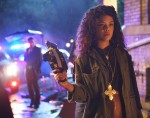The film “Dear White People” delves into the notion of institutionalized racism through the lens of four black students in a fictional Ivy League college, Winchester University. The movie explores racial identities through the students’ interactions with various student groups and administrators.
“Dear White People” will be screened in Melnitz Hall as part of an event sponsored by UCLA Executive Vice Chancellor and Provost Scott Waugh, Department of African American Studies, the Institute of American Cultures, Ralph J. Bunche Center for African American Studies, Luskin School of Public Affairs and School of Theater, Film and Television. It will be screened Wednesday at 7 p.m., followed by a discussion with writer and director Justin Simien, executive producer Stephanie Allain and producers Effie Brown and Julia Lebedev.
In anticipation of the film’s screening, the Daily Bruin’s Aubrey Yeo spoke to Brown about the movie and her experience making it.
Daily Bruin: Would you be able to tell me about your role in making the film?
Effie Brown: It was actually my company, Duly Noted Inc., that made the movie. I was the lead producer, so everything from helping to secure the financing … all the way to whipping the script into production shape (is) what I did.
DB: What was your intention when you made the film?
EB: My intention as a producer was to get a new and innovative vision from a first-time filmmaker up on the screen, as well as showing a different slice of life that you don’t really ever get to see with people of color. It was kinda great, it was fresh, new satire with black folk. I love it.
DB: What do you remember the reaction to the film being?
EB: The reaction to the film was exactly what we expected. It was a conversation starter – we expected people to talk about it whether they liked it or not, but basically, in my opinion, it hit its purpose and stride when people started talking about it. That’s the main thing – it was a conversation starter.
DB: Speaking of conversation starters, the film dives into the hot-button topic of institutional racism. Was it difficult to get any of these green-lit?
EB: It was difficult. It was more so difficult to get the project green-lit because we had a first-timer with an unproven track record. That’s why (director Justin Simien) was so smart in doing a concept trailer to show that there was an audience for them and that his idea could be proven and could work. Once he did that concept trailer and he caught on like a house on fire, it was definitely easier to get doors to open. … There were people who wanted to make the movie, but they didn’t want to give us enough money to make the movie or enough resources, but we definitely had interest.
DB: Were there any events from your personal life or the life of someone close to you that inspired events in the movie?
EB: Well, you’re speaking to a black woman who went to a pretty much all-white college, so I can say the film actually resonated with me quite a bit, with me being a woman … a woman of color trying to assimilate and be yourself. That’s always challenging to do at that age. Also to be the other in a situation. I didn’t write the script or anything like that; however, the script that Justin wrote resonated with me completely.
DB: What’s next for you as a producer?
EB: I’ve produced about 17 films, from little movies to big movies. Right now, I’m on “Project Greenlight” on HBO with Matt Damon and Ben Affleck producing the (winning) movie and being part of the reality show docuseries. I’ve been doing a couple of movies with Lionsgate, and I just sold a film to Lifetime. I do all different types of movies, but they do all have the common theme of “the other,” and what that means to be “the other,” whether it be in a genre film like action, horror or a satire.
Compiled by Aubrey Yeo, Bruin senior staff.

One thing that struck me watching the film was how touched I was by it once i realized that it was far more complicated emotionally than I was prepared for. The trailers were quite funny, but the movie itself paints a fairly layered arc of multiple characters who are torn between how they feel perceived and how they present themselves, the struggle between the desire to be seen and the desire to sometimes be invisible — an option not available to them that most white people (certainly at a mostly-white college) take for granted.
I do think this brings up another interesting discussion – the pressure in Hollywood for comedy/dramas to be marketed as either comedy or drama. For a thematically complex film, it’s is real dilemma. What’s the best way to get people in the theater while not creating expectations that initially make them wonder if they are missing something?
That said, DWP does a very sly and valuable thing. It reminds us that whatever archetypical personalities we try on, particularly when young, we are first and foremost seeking authenticity. That experience is just as potent within and between African-Americans as it is with Caucasians, and yet that reality seems to find far more agency on TV than in film. Bravo to Effie and Justin asserting that a “black” comedy get to be first and foremost a human comedy.
bigots made a movie and want a pass on being bigots because they were hurt by other bigots